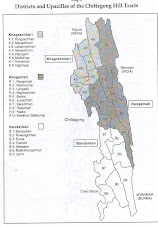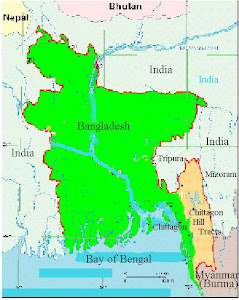
Recently, our reporter visited Kapru Para in Bandarban to investigate the impact of outside interaction on the life of Murung nationality, the third largest ethnic group in Chittagong Hill Tracts. We are releasing the findings in a series of photographic expositions. Please find attached the third of the six-picture series.
Photo 3 of 6: Murung women at work
Murung women are hard working. They work both at home and in the Jum field. In the Jum they grow rice, cotton, sesame, chilli, ginger, turmeric and vegetables. They also grow different kinds of fruit orchards such as pineapples, orange, papaya and jackfruit. Nowadays many of them have turned to teak and other cash yielding tree plantations. In the area bamboo grows abundantly - however this year the bamboos have begun to die out.
The Murungs also tend cows, buffalos and pigs; and rear poultry at home. Generally, they live in a subsistence economy.
There is a rumour in the village that their lands will be taken away for expansion of military facilities. This has made them worried about their future. None save one has documents concerning ownership of their lands.
Of the 38 families, only Lachyong Murung got documents for his land. He was a commander of a militia formed in the days of "insurgency" to counter the Shanti Bahini guerrillas. He used his clouts to register his land with the government land office. None others of village have been granted land settlement. It is quite irony that the government should deny them the right to have documents in relation to their lands while thousands of illegal Bengali settler families have been provided so-called khas lands along with title documents. It would be singularly inhumane if they are forced to leave their ancestral village in order to make room for expansion of military facilities.
Generally, the Murungs are not familiar with the idea of private ownership of land. Their society is a kind of communistic society in which land is own by the whole community. There is a increasing demand that the government of Bangladesh respect this customary land laws of the Jumma nationalities including Murungs.





